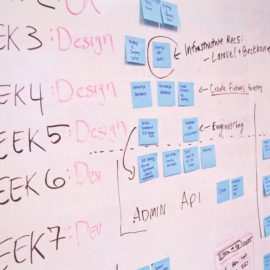

This article is an excerpt from the Shortform book guide to "Nine Lies About Work" by Marcus Buckingham and Ashley Goodall. Shortform has the world's best summaries and analyses of books you should be reading.
Like this article? Sign up for a free trial here .
Do you want to know how to build a successful team for your business? Why should you focus on developing your employees’ strengths rather than fixing their weaknesses?
In their book Nine Lies About Work, Marcus Buckingham and Ashley Goodall say that the key to building a successful team is encouraging your subordinates to develop their unique strengths rather than fix their weaknesses. To do this, you must determine what outcomes you want from your team and then figure out how each member can help you achieve those outcomes given their individual strengths.
Here’s why leaders should shift their focus from weaknesses to strengths in order to build a successful team.
People Shouldn’t Work on Their Weaknesses
Leaders typically evaluate employees on their core competencies or specific skills required for the job. Those who are proficient at most or all of the competencies are given opportunities for advancement. Meanwhile, those who demonstrate weaknesses in the workplace are held back from promotion, even if they have specific (though limited) strengths. These employees are then required to work on their weaknesses to become more well-rounded and, thus, have a chance to move up the ranks. However, the authors argue that focusing on improving weaknesses in this way erroneously equates excellence with well-roundedness.
(Shortform note: The authors write that well-roundedness isn’t something to strive for, but David Epstein champions its merits. In Range, he argues that generalists fare better than specialists in the modern world. This is because generalists can more easily pivot to keep up with rapidly changing times, while specialists have fewer transferable skills to allow them to adapt to an unpredictable world.)
People Should Develop Their Unique Strengths
The authors believe that excellence is not about becoming a jack or jill of all trades, but becoming a master of one (or a few). Thus, as a leader, you should help people develop the abilities they already have instead of forcing them to make up for their weaknesses. This is a much more efficient way to build the successful team you envision for your company.
While improving on weak areas can be helpful, the authors stress that there is much more to be gained by determining and nurturing people’s unique strengths. For example, a basketball coach won’t try to turn Steph Curry—one of the greatest shooters in NBA history—into an excellent defensive player; instead, he’ll make sure that Curry can make the most significant impact by giving him opportunities to shoot.
(Shortform note: In The 5 Levels of Leadership, John Maxwell writes that putting together people with complementary strengths can increase productivity. However, you can only do this if you know their strengths, and that comes from building a relationship with each team member. To do this, he says to make the decision to like people, think of at least one positive thing about each person, and include them in your decision-making.)
In their book Nine Lies About Work, Marcus Buckingham and Ashley Goodall explain how to build a successful team. The key, they say, is to shift your mindset from improving workplace weaknesses to prioritizing strengths by focusing on building a diverse, strong team.
How to Turn Team Members Into Team Players
The authors stress the importance of building a successful team whose members have complementary strengths. However, strengths alone aren’t enough to make a team successful—cooperation is important too. To build a strong, collaborative team, Patrick Lencioni says that you should coach your team members to become team players who embody three essential qualities: humility, drive, and people skills.
In The Ideal Team Player, he gives tips to help team members develop these qualities:
- Humility: Encourage them to compliment their coworkers and to admit when they’ve made a mistake.
- Drive: Set specific performance goals that push them to either step up or leave.
- People skills: Make them more conscious of their behavior by immediately pointing out when they did or said something that negatively affected others.

———End of Preview———
Like what you just read? Read the rest of the world's best book summary and analysis of Marcus Buckingham and Ashley Goodall's "Nine Lies About Work" at Shortform .
Here's what you'll find in our full Nine Lies About Work summary :
- The nine organizational lies and what leaders can do to address them
- Why free lunches and breakroom pool tables don't matter
- Why you should stop seeking a work-life balance






